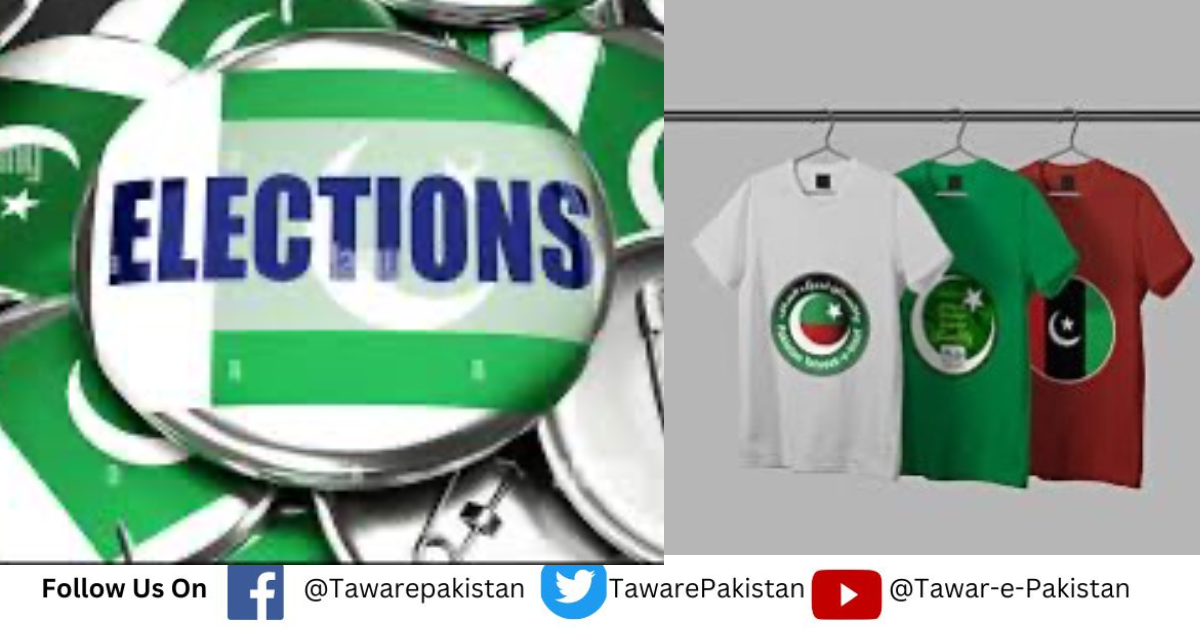As the general elections loom just 23 days away, a noticeable lethargy surrounds the sale of campaign-related items in the market. Panaflex, cloth banners, buntings, caps, and badges, crucial elements in political campaigns, are experiencing a downturn in sales. Manufacturers attribute this lackluster performance to the prevailing uncertainty about whether the polls will indeed take place on the announced date. There is uncertainty and no sales in market about elections campaign material related stuff.
Sheikh Nisar Parchamwala, Chief Executive of VIP Flags at the Paper Market, sheds light on the subdued atmosphere, suggesting that political parties and even the general populace appear uncertain about the upcoming February 8 elections. The anxiety among stakeholders in the printing industry and candidates from various political parties regarding the certainty of the elections further contributes to the lack of vibrancy in the election environment.
Parchamwala notes a recent uptick in orders, but the overall election atmosphere pales in comparison to the 2018 polls. He expresses concerns about the impact of the absence of Pakistan Tehreek-i-Insaf (PTI) from the election scene due to unresolved issues with their electoral symbol, the ‘bat. Which announced last night. Now every candidate would have different symbols in PTI, how we will sale materials, he questioned.
‘This absence has resulted in a 30-35% reduction in production capacity for the 2024 polls. The fear of potential financial losses due to the absence of advance orders from PTI looms large.
Interestingly, despite the overall sluggishness, printing work for flags and other campaign-related items has been ongoing for the past month in some constituencies in the city and the interior of Sindh. However, the absence of PTI’s participation has created a void, affecting the market dynamics.
The impact of the symbol issue resonates throughout the industry, with manufacturers facing challenges in recouping their investments made in producing PTI’s symbol-related election items. The unresolved status of PTI’s ‘bat’ symbol, yet to be officially handed over to the party, poses a considerable risk to the manufacturers.
Parchamwala highlights the role of political rallies in influencing the sales of election-related items. Currently, the lack of such activities by contesting parties is contributing to lackluster sales. He anticipates a positive impact on sales if these rallies resume in the run-up to the elections.
Moreover, Parchamwala observes a new trend among political parties, with orders being placed for the ‘mufflers or scarves’ introduced by PTI last year. These items, priced at Rs80-90 each, are gaining popularity among the political parties.
In terms of sales figures, the Pakistan Peoples Party (PPP) is currently leading, placing orders and acquiring finished items for various campaign materials. The Grand Democratic Alliance (GDA) has also shown increased interest this year compared to the previous election cycle.
However, the scenario could change if PTI manages to resolve its symbol issue. Parchamwala expresses hope that the sales of flags and related items will improve if PTI can secure the return of its ‘bat’ symbol. The preparation for elections and the production of related items typically begins six to eight months before the elections. The manufacturers face significant financial risks if the sales of finished items fail to pick up or remain unsold.
Adding to the complexity, the lack of political rallies and the decline in interest among young boys aged 20-22 are contributing to the subdued sales environment. High living costs, including elevated food prices, utility bills, and house rents, are cited as reasons for the younger generation focusing more on securing jobs to meet increasing household expenses rather than participating in political activities.
The economic challenges are reflected in the sales figures, with only 10-15% of panaflex sales activities ongoing. Mohammad Dawood Khan of Decent Printers at Al Karam Square notes a decline in screen printing, with most work shifting to machines. The work for PTI is minimal, while banner production for PPP and other parties continues.
The 2024 polls present a unique set of challenges for manufacturers of campaign-related items. The unresolved symbol issue of PTI, coupled with economic challenges and a decline in political interest among the youth, is shaping a subdued business outlook in the run-up to the elections.
The fate of the market seems intricately tied to the resolution of PTI’s symbol issue and the resumption of political rallies, factors that could inject much-needed vibrancy into the elections campaign material industry.
Tawar-e-Pakistan Unveiled: Your Gateway to Informed Living!


Comments are closed, but trackbacks and pingbacks are open.